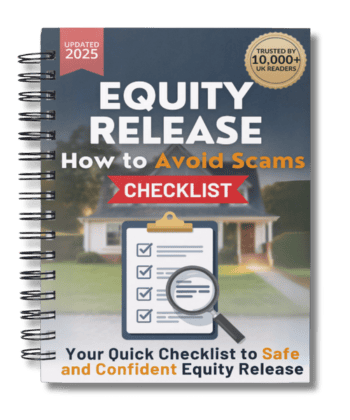
Ways Equity Release Can Help You Pay Off Your Mortgage in 2025
 Be aware. Equity release comes with drawbacks which are important to think about. Lifetime mortgages are secured loans. Compound interest means the amount you owe can grow quickly. Equity release reduces your estate's value and may impact means-tested benefits.
Be aware. Equity release comes with drawbacks which are important to think about. Lifetime mortgages are secured loans. Compound interest means the amount you owe can grow quickly. Equity release reduces your estate's value and may impact means-tested benefits.Key Takeaways...
- Equity release provides an option to pay off your existing mortgage by converting part of your home's value into accessible funds, either as a lump sum or in regular payments.
- Benefits include eliminating monthly mortgage payments and boosting your cash flow, albeit with a reduction in your estate's value and affecting your eligibility for means-tested benefits.
- The process includes getting your property valued, obtaining professional financial advice, choosing an appropriate plan, and applying the funds towards your mortgage.
Have you been wondering, "Can I use equity release to pay off my mortgage?"
According to a recent report by The Telegraph, one in six first-time buyers who took out a mortgage in December 2022 will still be paying off that loan into retirement.1
Are you facing the same outlook? Could equity release be an option if you do not want to keep making mortgage payments when you are in later life?
In This Article, You Will Discover:
The team at EveryInvestor has researched the equity release market to present the pros and cons of these products and put together this guide on whether it may be worth it to use your property value to clear your mortgage.
Find out now if repaying your mortgage in this way could work for you.
What Is Exactly Equity Release?
Equity release is a financial concept designed for those 55 and older, enabling them to access the value locked in their home's equity.
It is ideal for those who need cash without wanting to sell their home.
This approach includes lifetime mortgages, where homeowners borrow against their home, and home reversion plans, where they sell a part of their property, both with deferred repayment terms.
Releasing home equity for improvements can be a strategic financial move, enabling homeowners to enhance the comfort and value of their residence.
Can You Use Equity Release to Pay Off Your Mortgage?
Yes, you can use equity release to pay off your mortgage; many people choose this option to clear their existing mortgage debt, thereby reducing their monthly outgoings and potentially freeing up income for other uses in retirement.

This strategy not only simplifies your finances by consolidating debt but also potentially reduces your monthly outgoings, providing a more relaxed and comfortable retirement.
However, it is important to consider that equity release does mean decreasing your property’s net worth. We recommend seeking expert financial advice to fully understand the implications.
For instance, it could affect your ability to leave a substantial inheritance or even your eligibility for certain benefits. It is about making an informed decision that fits your individual circumstances.
How Does Equity Release Work to Repay a Mortgage?
Equity release to repay a mortgage works according to a step-by-step process.
Below are the steps to follow:
- Assessment: First, you need to seek independent financial advice to assess your eligibility, discuss available options, and evaluate the suitability of equity release for your circumstances.
- Application and valuation: If equity release is right for you, you can apply for the selected plan, and the provider will send a surveyor to conduct a valuation of your property to determine its current market value.
- Approval and mortgage equity release repayment: If your equity release mortgage is approved, the released funds will immediately be used to pay off your existing mortgage, effectively removing the mortgage debt and leaving you with the equity release loan. This will then become the new financial obligation secured against the property.
- Equity release loan: The balance of your equity release loan amount will be released either as a large lump sum or as a smaller lump sum (with the rest placed in a drawdown facility for you to access when you wish).
The loan is typically repaid only upon your passing or when you move into long-term care, unless you decide on voluntary repayments.
How Long Does It Take to Repay Your Mortgage Using Equity Release?
It can take up to three months to repay your mortgage using equity release, depending on how long the equity release application process takes.6
Once your application has been approved, your solicitor can repay your existing mortgage equity release in full with a single legal transaction.
The duration of this process will depend on how complex your situation is.
Factors to Consider Before Making a Decision
Factors to consider before making a decision about using equity release to pay off mortgage include eligibility, the financial implications, the long-term impact, your alternative options, and seeking professional advice.
More information...
- Eligibility: Determine if you meet the eligibility criteria for equity release, which typically includes being a homeowner above a certain age (usually 55 or older). However, there are additional criteria you may need to consider.
- Financial implications: Make sure you understand the interest rates, fees, and potential impact on inheritance.
- Long-term impact: Consider the long-term impact on your finances and lifestyle, as accessing equity from your home reduces the value of your estate and may affect your eligibility for means-tested benefits. You also need to consider if you will need the equity release funds in the future.
- Alternative options: Explore other ways to repay your mortgage. These could include renegotiating mortgage terms, making additional repayments, or downsizing.
- Professional advice: Seek advice from an independent financial advisor or broker who specialises in equity release to ensure you understand the process, risks, and potential alternatives.
Should You Pay Off Your Mortgage Early?
Whether you should pay off your mortgage early depends on your individual circumstances, so it's best to consider factors such as interest rates, financial goals, tax implications, and long-term housing plans.

Factors to consider include...
- Whether you have more expensive debts to pay off first.
- Whether you are saving into a pension scheme.
- Whether your family would be provided for if you pass away.
- Whether you would be better off saving your money.4
- How much you may be charged in fees or penalties for repaying your mortgage early.5
Consult with a financial advisor or broker to assess the impact on your overall financial picture and make an informed decision.
How Equity Release Can Help You Pay Off Your Mortgage Early
Equity release can be a powerful tool for paying off your mortgage early by unlocking the value tied up in your home without the need to sell it.

Here are some key ways it works:
- Immediate Access to Funds
Equity release provides a lump sum or regular payments, enabling you to clear your remaining mortgage balance ahead of schedule. This can help you save on interest payments and achieve financial freedom sooner. - Flexibility in Usage
Unlike traditional loans, ER funds are not restricted. This means you can use the released equity specifically for mortgage repayment without having to justify the purpose to a lender. - No Monthly Repayments
Certain ER plans, such as lifetime mortgages, don’t require monthly repayments. Instead, the loan and any accrued interest are repaid when the property is sold, typically after you pass away or move into long-term care. This makes it an appealing option for those wanting to pay off their mortgage without impacting their monthly budget. - Reduction in Financial Stress
Clearing your mortgage early through ER can reduce financial obligations, giving you more flexibility to manage your finances or invest in other areas, such as retirement planning. - Potential for Lower Long-Term Costs
By paying off your mortgage early, you avoid further compounding interest on your existing home loan, potentially saving a significant amount over time.
Equity release offers homeowners a path to becoming mortgage-free while staying in their property, but it’s essential to weigh the long-term implications, including reduced inheritance for beneficiaries.
Consulting a qualified financial advisor ensures you make an informed decision that aligns with your financial goals.
The Pros and Cons of Paying Off Your Mortgage Early
The pros and cons of repaying your mortgage early include significant interest savings and increased financial freedom as advantages, while potential early repayment penalties and reduced liquidity are notable drawbacks.

A look at what you need to know...
Advantages
The advantages of repaying your mortgage early using equity release include freeing yourself from monthly mortgage payments.
A quick look at some more benefits...
- Eradicating interest payments: By repaying your mortgage early, you will no longer need to worry about your monthly mortgage payments.
- Achieving financial freedom: Being mortgage-free can provide a sense of financial security and freedom. If you do not have a mortgage payment, you will have more money to put toward other aims, like saving for retirement, travelling, or investing.
- Increasing your home equity: By repaying your mortgage early, you will build home equity faster. That being said, if you choose equity release, you will actually reduce the equity in your estate.
Disadvantages
The disadvantages of repaying your mortgage early using equity release include the impact on inheritance and means-tested benefits.
Some drawbacks you will need to consider...
- Opportunity cost: When you use a significant portion of your savings or property equity to repay your mortgage early, you miss out on potential investment opportunities that could yield higher returns. If the interest rate on your mortgage is relatively low, you may be able to invest your extra funds in other assets, such as stocks or mutual funds, which could generate higher long-term growth.
- Effect on benefits: Taking out equity release to repay your mortgage could make you ineligible for certain means-tested benefits.
- Effect on inheritance: Equity release will reduce the inheritance you are able to leave to your heirs.
- Overall cost: Equity release is a relatively expensive way to borrow money.
- Limited opportunity for investment diversification: By allocating a significant amount of your property value towards early mortgage repayment, you may miss out on diversifying your investments across different asset classes at a later stage in life.
It is important to consult an equity release broker or advisor about these pros and cons.
Are There Alternative Ways to Repay a Mortgage?
Yes, there are alternative ways to repay a mortgage, which include overpayments to reduce the term, switching to a different mortgage plan, or using investment returns or lump sum payments to clear the debt sooner.
Options include...
- Making overpayments to pay off the mortgage faster.
- Remortgaging to a loan with better terms, possibly with lower interest rates, to save money and pay off your mortgage faster.
- Renting out spare rooms to provide additional income to help repay your mortgage faster.
- Selling your property and buying a cheaper one can free up cash to repay your mortgage.
- Taking a payment holiday (offered by some lenders), can help if your are struggling with repayments in the short term, but it will extend the mortgage term.
- Extending your mortgage term to lower your monthly payments (though this option will make you pay more in interest over the long run).
- Getting an offset mortgage reduces the amount of interest you pay by combining your savings and mortgage, thereby offsetting the balance of your savings against your mortgage debt.
- Using savings or investments if that is an option.
- Seeking help from family if they may be willing to provide a loan or gift to help repay your mortgage.
Please note that it is always best to seek advice from a financial advisor before making any decisions regarding your mortgage, as different options may be more or less suitable depending on individual circumstances.
What Happens When You Pay Off Your Mortgage in the UK
When you pay off your mortgage, your lender will send you a completion statement confirming that the debt has been cleared.
You should also receive the title deeds if they were held by the lender, though most properties are now recorded digitally with the Land Registry. At this point, no further payments are required, and the property is fully yours.
However, you may need to complete some final steps. Contact the Land Registry to ensure the mortgage is removed from your property title. This confirms that no lender has a legal charge over your home, giving you full ownership.
What If You Do Not Have Enough Equity to Repay Your Mortgage?
If you do not have enough equity to repay your mortgage, you will not qualify for equity release.
Repaying your existing mortgage is a requirement for anyone taking out equity release because your equity release lender will insist on having the sole charge over your property.

Common Questions
If you release equity from your home through a lifetime mortgage or home reversion plan to pay off a mortgage in the UK, the funds obtained through this equity release process are generally untaxed.
This means you will not typically need to pay income tax or capital gains tax on the released equity.
However
Releasing equity can have implications for means-tested benefits or care costs, so it is important to seek professional advice regarding your specific situation.
The maximum amount of equity you can release to repay your mortgage depends on several factors, including your age, the value of your property, and the specific equity release product you choose.
Yes, you can use equity release to repay your Interest-Only mortgage.
In fact, according to data from Responsible Equity Release, almost 30% of equity release clients used the money they borrowed to pay off a mortgage.7
If you use equity release to pay off your mortgage, it can impact your benefits, but it will not affect your state pension.
However, equity release may affect part of your Pension Credit.8
It may also have an impact on other means-tested benefits, like Council Tax reduction and Universal Credit, as the released equity may be considered capital or income when your benefits are assessed.
There may be penalties like Early Repayment Charges or administration fees if you repay your mortgage early.9
Review the specific terms and conditions of your mortgage to calculate whether it would be worth repaying your mortgage before the end of it’s term.
Using equity release to repay a mortgage carries certain risks.
These may include:
- The potential impact on inheritance
- Accumulation of interest over time
- Potential reduction in means-tested benefits
- Potential limitations on future borrowing
Be sure to speak to a financial advisor or broker to discuss mitigating these risks.
To compare equity release providers for repaying your mortgage, you can start by comparing interest rates, fees, loan-to-value ratios, flexibility in repayment options, customer reviews, and the types of equity release products offered.
Seeking independent financial advice can help you navigate the complexities and find the most suitable provider for your specific needs.
Using equity release to clear mortgage debt has it’s advantages and disadvantages. On the positive side, it can provide financial relief by eliminating your monthly mortgage payments and releasing cash for other purposes.
Additionally, you can continue living in your home with no need to downsize or move.
However, there are drawbacks to consider. Equity release may reduce the inheritance you can leave for your loved ones, as the loan and interest will need to be repaid when you pass away or move into long-term care.
It is also important to note that interest rates on equity release products can be higher than traditional mortgages.
It is crucial to seek independent advice, compare different options, and understand the long-term implications before proceeding with equity release for mortgage clearance.
Conclusion
If you are over 55 and aiming for mortgage-free homeownership in the UK, equity release could be an option to explore.
It is crucial to evaluate the risks, compare different providers, and seek independent financial advice to ensure the best outcome for your circumstances.
Understanding these factors will help you make an informed decision about using equity release to pay off mortgage.

Found an Error? Please report it here.





 100% private. No pressure. Just friendly guidance.
100% private. No pressure. Just friendly guidance.


